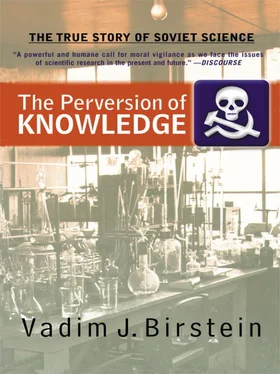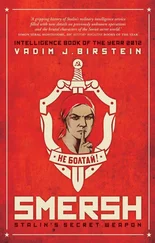On Sundays, some of the Bolshevik leaders, especially Bukharin, visited this dacha. Bukharin took my eight-year-old father for long entomological excursions, which my father remembered all his life. Today, some of Bukharin’s drawings of insects have been published, and I think that he could easily have been a professional zoologist. At the same time, despite all his intelligence and education, Bukharin was a stanch Bolshevik who sincerely believed in the existence of only one, socialist approach to organization of the economy and society. 57
Once I asked my grandmother what she and my grandfather, who died in 1922, had in common with the Bolsheviks who visited the dacha. I felt she could have nothing in common with them. Two of her brothers were active in Russian politics at the beginning of the twentieth century, even becoming members of the State Duma: Grigory (Girsh) Bruck represented the Zionist Party, and Pavel Bruck was a member of the liberal party of Constitutional Democrats. Both later emigrated, to Palestine and Paris, respectively. In 1907, she volunteered to assist the Jewish emigration movement. As a doctor, she accompanied and supervised a huge group of Jewish emigrants that arrived in New York on the ship Moskwa . I still keep her pass to Ellis Island, issued to “Dr. Sophie J. Bruck, representing Jewish Colonization Society” on October 3, 1907. To my question about the Bolsheviks, my grandmother answered exactly as Countess Alexandra Tolstoy did at the Tactical Center trial: “I heated a samovar for them.”
Emotionally, it is difficult to read the memoirs of those who witnessed the trial. “The admission of three of the doctors—Levin, Pletnev and Kazakov—were especially convincing,” Professor Iliya Zbarsky recalled. He continued:
They confessed that on the orders of People’s Commissar for the Interior Yagoda… they had treated the writer Maxim Gorky, and his son Maxim Peshkov, in such a way as to accelerate their death. They had done the same in cases… of many other… figures. Their testimony went into detail about how they administered poison to their patients. These statements made such an impression on me that I became convinced the accused men were guilty. Most of them begged that their lives be spared. Some, like Yagoda… went down on their knees and tearfully implored “beloved Comrade Stalin” to pardon them. It was rumored later that Stalin had been present at the trial, peering through a spy-hole in the wall and thoroughly enjoying the spectacle. 58
Yagoda, Bulanov, Bukharin, and sixteen other trial defendants were condemned to death. 59Of course, Stalin did not keep his word. Apparently, he was outraged: in the last speech, Bukharin denied not only his own guilt, but the reason of the whole trial. “After only a few minutes his moral and intellectual superiority over his accusers was plain,” recalled Zbarsky. 60Two doctors, Levin and Kazakov, were shot right after the trial’s conclusion. 61Yagoda was shot two days afterward, on March 15, 1938. 62Bukharin was shot last, on the same day.
Yagoda’s wife was also arrested and shot, and his parents were arrested and died in labor camps. 63All of Yagoda’s closest assistants were arrested one by one and shot. Yagoda was not rehabilitated in the 1980s–1990s. It is interesting that Vyacheslav Molotov, the long-term chairman of the USSR Council of Commissars (1930–1946) and subsequently of the Council of Ministers (1946–1949), a Politburo member and the second most important person in the Soviet Union after Stalin, believed the poisoning accusations were true even forty years after Yagoda’s death. 64
Only in the late 1990s did members of Memorial (Moscow) discover the location of the burial site of Bukharin, Bulanov, Kazakov, Levin, some other victims of this show trial, and Yagoda’s wife and sister, at a special NKVD execution site in the suburbs of Moscow near the village of Kommunarka, on the property of Yagoda’s former dacha. 65This mass grave contains the bodies of approximately 4,500 men and women executed by NKVD assassins from 1937 to 1941. According to archival documents, on the whole 32,000 of the arrested Muscovites were shot by the NKVD during this period (29,200 of them in 1937–1938) in Lubyanka Prison and at two suburban sites, near the villages of Kommunarka and Butovo. 66Some of the bodies were cremated at the former Donskoi Monastery in Moscow, and ashes were buried near the crematorium in this monastery.
Dr. Pletnev’s fate was different: The sixty-six-year-old professor was sentenced to twenty-five years’ imprisonment “with the confiscation of all his personal property.” 67The confiscation of his property was a very pragmatic point: He had a good collection of art that he had started to purchase before the Bolshevik Revolution. Pletnev was put into Vladimir Prison. In his appeal to the Soviet leaders, he described the interrogations during the preparation of the Bukharin trial:
All charges made against me were a falsification. My “confession” was forced out of me by violence and deception… When I did not give way the investigation literally said: “If the leadership suppose you to be guilty then even if you were 100 percent innocent, you would be guilty…” Appalling bad language was used against me, and the threat of the death penalty. I was dragged by my collar, choked and tortured with sleepiness: over a period of five weeks I slept for only 2–3 of every 24 hours. They threatened to tear out my throat and with it my confession; they threatened to beat me with rubber truncheons… All of which reduced me to a paralysis of half of my body. I am numbed by the cold-blooded lying of those pygmies and worms that are carrying on their subversive work. Show that the truth is as possible to establish in the Union [USSR] as in other civilized countries… May the truth shine forth! 68
His words were heeded by the Soviet leaders: On September 8, 1941, Pletnev was resentenced to death. He was shot three days later in the city of Orel’s prison, where the inhabitants of Vladimir Prison had been moved at the beginning of the war. 69
It is hard to believe, but Joseph E. Davies, the American ambassador to Moscow in 1936–1938 and a close friend of the American president Franklin D. Roosevelt, considered the victims of the Bukharin trail to have been members of a true anti-Soviet plot. Mr. Davies attended some of the court sessions and described the trial in his extremely popular book Mission to Moscow, published in 1941. 70The book sold 700,000 copies and was translated into thirteen languages. 71Davies knew Dr. Pletnev and some of the other defendants personally. However, he wrote in his diary: “The ‘last words’ of Pletnev, [Arkadii] Rosengoltz [former commissar for foreign trade], and other defendants were harrowing in their interest and tragedy… The defendants in this trial, including some of these men, according to their statements wanted war!” 72In the official telegram to Secretary of State Cordell Hull dated March 17, 1938, Davies concluded: “…It is my opinion so far [as] the political defendants are concerned [that] sufficient crimes under Soviet law, among those charged in the indictment, were established by the proof and beyond a reasonable doubt to justify the verdict of guilty of treason and the adjudication of the punishment provided by Soviet criminal status.” 73
With the involvement of the White House, Davies signed a contract with Warner Brothers for a film based on his book. 74This propaganda movie under the same name Mission to Moscow was directed by the famous Hungarian-born Michael Curtiz and was finished in 1943. Curtiz’s previous film Casablanca is known as one of the best American movies. The script of Mission was written by another Hollywood luminary, screenwriter and producer Howard W. Koch, the author of the script for Casablanca . During the filming, Davies kept Roosevelt informed on Mission ’s progress. 75After the release, Mission was named “Hollywood’s most controversial film ever.” 76John Dewey, who had headed the American commission of inquiry into the Moscow trials, called this movie “the first instance in our country of totalitarian propaganda—a propaganda which falsifies history through distortion, omission or pure invention of facts.” 77
Читать дальше











